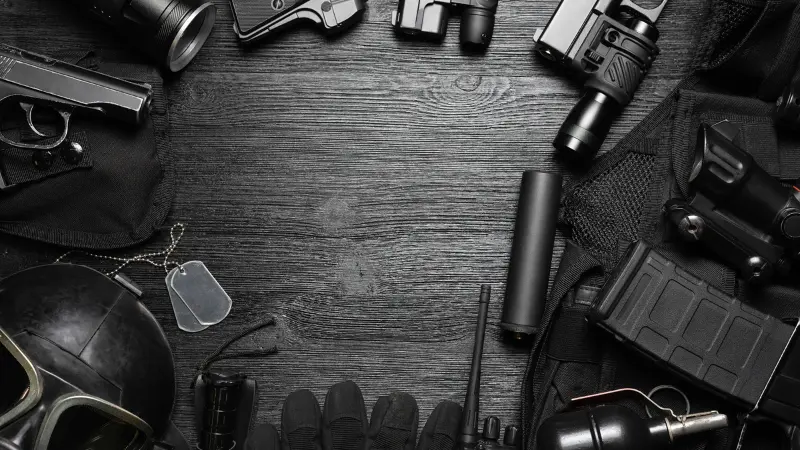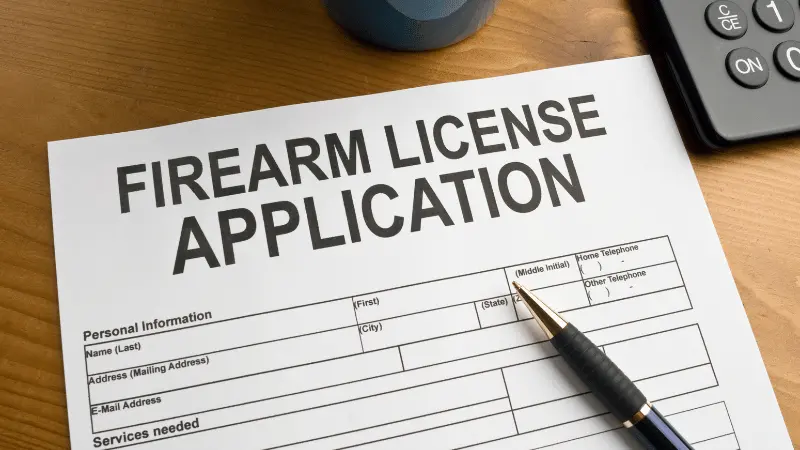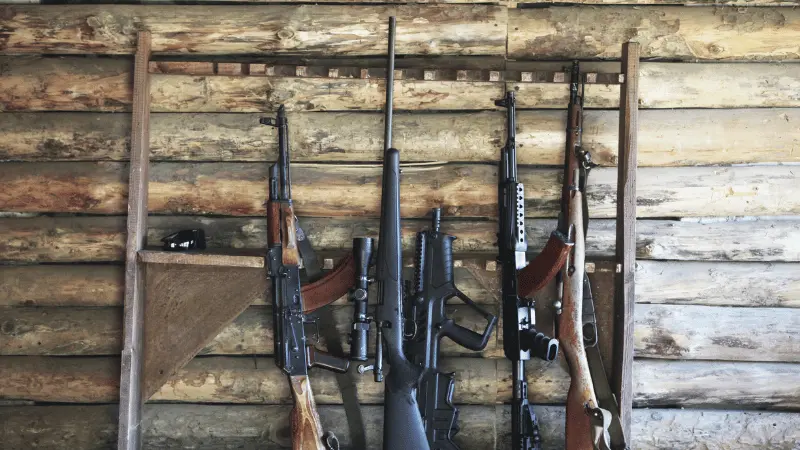.In the United States, a felony conviction often results in losing the right to possess firearms and other weapons. For felons, understanding the laws that limit their rights to own weapons is critical knowledge. The consequences of breaking these laws can have severe legal and personal ramifications, including significant fines and imprisonment. The question remains: what weapons can a felon own?
Let’s examine federal and state laws on this topic, list the weapons that are prohibited for felons, and explore the circumstances in which felons may be able to own weapons. We will also discuss the consequences of owning illegal weapons as well as the steps felons can take to restore their gun rights.
What Weapons Can A Felon Own?

The possession of weapons by felons is a controversial topic in the United States. With an estimated 6.5 million felons living in America, the question of whether they should be allowed to possess weapons has significant legal and practical implications. In this article, we will explore the laws and regulations surrounding felon possession of weapons and answer some commonly asked questions.
Under federal law, it is a crime for a felon to possess any firearm or ammunition. This law also prohibits felons from possessing other types of weapons that may be used for lethal purposes, such as explosives and bombs. State laws on felon possession of weapons can vary, with some states having stricter laws than federal law and others having more lenient laws.
Also, read; Can A Felon Get A Hunting License?
Federal Law on Weapon Possession
The Gun Control Act (GCA) of 1968 is a federal law that regulates the firearms industry and gun ownership. Specifically, the law prohibits anyone who has been convicted of a crime punishable by imprisonment for more than one year from possessing any firearm or ammunition.
The Brady Handgun Violence Prevention Act (also known as the Brady Bill) is another federal law that restricts firearm ownership for convicted felons. This law requires all firearm purchasers to undergo a background check before the purchase can be completed. As part of this process, the purchaser must disclose any prior felony convictions.
Federal laws on felon possession of weapons are clear: it is illegal for a convicted felon to possess any firearm or ammunition. This includes any weapon that can be classified as a firearm, such as a handgun, rifle, or shotgun. Felons who are caught possessing firearms can face up to 10 years in prison.
State Laws on Weapon Possession
The specific laws surrounding felon weapon possession can vary significantly from state to state. In some states, felons may be prohibited from owning not just firearms, but also knives, brass knuckles, or other potentially dangerous items. In other states, the restrictions may only apply to certain types of firearms or to felons who have been convicted of violent crimes.
Differences Between Federal and State Laws
The primary difference between federal and state laws on felon possession of weapons is the severity of punishment for violating the law. While federal law imposes a mandatory minimum sentence of 10 years in prison for felons caught possessing firearms, many states have a less severe punishment for the same crime.
List Of Weapons Prohibited For Felons
- Guns And Firearms
Felons are not allowed to possess any type of firearm, including handguns, rifles, and shotguns. This ban extends to ammunition as well.
- Explosives And Bombs
Felons are prohibited from possessing any explosive device, such as bombs or grenades. This also includes any material that can be used to make explosives.
- Knives And Other Weapons
Some states have additional restrictions on the types of weapons that felons may possess. For example, in California, felons cannot possess certain types of knives or brass knuckles.
Exceptions and Circumstances for Felons to Own Weapons

- Restoration Of Gun Rights
In some cases, felons may be able to restore their gun rights. This typically involves petitioning the court to have their conviction expunged or pardoned.
- Exceptions For Antique And Black Powder Firearms
Felons may be allowed to possess certain types of antique firearms or black powder firearms, as these weapons are not considered firearms under federal law.
- Self-defense Circumstances
In some states, felons may be allowed to possess firearms for self-defense purposes. However, this is typically only allowed in very limited circumstances and requires a court order.
Penalties For Felons Found In Possession Of A Weapon
As a felon, it is important to know the penalties for being found in possession of a weapon, as this could result in serious consequences. Both state and federal laws dictate the penalties for felons found in possession of a weapon.
State Penalties
In most states, it is illegal for a felon to possess a firearm, and those caught in violation of this law can face felony charges. The exact penalties vary depending on the state, but they typically include large fines and lengthy prison sentences. Additionally, felons found in possession of a weapon may face harsher penalties if they have a history of violent crime. Depending on the state, a felon can face up to 15 years in prison, with fines ranging from a few thousand dollars to over $100,000.
Federal Penalties
It is against the law for felons to own or possess firearms, according to federal regulations. Those who break this law may receive severe consequences, such as a sentence of up to ten years in federal prison and substantial fines. Additionally, felons may face other charges, such as possessing illegal firearms or having firearms during the commission of a crime.
Civil Liability and Lawsuits
Felons who own or possess firearms can face not only criminal penalties but also civil liability for any harm caused by the weapon’s use. This means that victims or their families have the right to file lawsuits against the felon and seek damages, which can have serious financial consequences.
Steps To Restore Felon Gun Rights
While convicted fellows are not allowed to own firearms, some may be eligible to have their gun rights restored. Here are some of the steps involved in the process.
Eligibility Criteria for Rights Restoration
Eligibility requirements vary by state, but generally, felons must have completed their prison sentence and any probation or parole. They must also demonstrate that they have been law-abiding citizens for a certain period and have not been convicted of any additional crimes.
Process of Restoring Gun Rights
The process of restoring gun rights involves filing a petition with the court or state agency that handles these types of cases. This process can be complicated, and it is recommended to seek legal assistance.
Restoration Of Firearm Rights At The Federal Level
Those who want to restore their gun rights at the federal level must apply to the Bureau of Alcohol, Tobacco, Firearms and Explosives (ATF). The process involves demonstrating that the felon is not a danger to society and has lived a law-abiding life since their conviction. However, the restoration of firearm rights at the federal level is a difficult and lengthy process.
Legal Assistance And Resources
Some legal resources and organizations can help felons understand their options and navigate the legal process. It is important to find a reputable attorney who specializes in gun rights restoration to ensure the best possible outcome.
Final Thoughts

Felons should be aware of the consequences of owning or possessing firearms and understand the steps involved in restoring their gun rights. Here are some key takeaways.
Most states prohibit felons from owning or possessing firearms, and federal law imposes serious penalties for violations.
There is a possibility of civil liability when it comes to gun rights restoration. However, some states are making progress in this area.
Future Outlook For Gun Rights Restoration
It is difficult and complex for felons to restore their gun rights. It is important to stay informed of changes in the law and seek legal assistance if considering it. Although felons face significant restrictions on weapon ownership, there are circumstances under which they may be able to own guns or other weapons. It is crucial to understand both federal and state laws and the consequences of breaking them. By taking the appropriate steps to restore their gun rights with proper legal assistance and resources, felons can regain an important aspect of their Second Amendment rights and become productive members of society. However, it is important to remember that breaking the law can have severe consequences.
I’m not aloud to have a firearm because I’ve made bad decisions that did not involve a firearm years ago I wish the laws could be update to changes these flaws